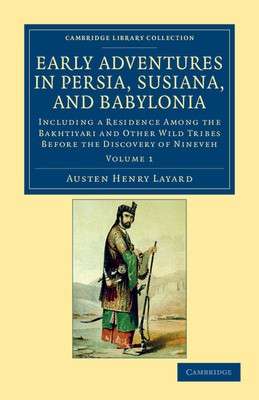
- We will send in 10–14 business days.
- Author: Austen Henry Layard
- Publisher: Cambridge University Press
- ISBN-10: 1108043429
- ISBN-13: 9781108043427
- Format: 14 x 21.6 x 2.9 cm, minkšti viršeliai
- Language: English
- SAVE -10% with code: EXTRA
Early Adventures in Persia, Susiana, and Babylonia (e-book) (used book) | bookbook.eu
Reviews
Description
Sir Austen Henry Layard (1817-94) was one of the leading British archaeologists of the Victorian period. His excavations at Nimrud and Nineveh led to important discoveries about ancient Mesopotamia, particularly about the Assyrian civilisation, and his popular books such as Nineveh and its Remains (1849) brought archaeology to a wide audience. This two-volume work, first published in 1887, tells the story of an 'adventurous journey' Layard had made over forty years earlier, in 1840-2. He learnt Arabic and Persian and travelled widely, even among tribal peoples notorious for their lawlessness. These included the mountain-dwelling Bakhtiyari, who were under threat from the Persian ruler. Volume 1 describes the ancient sites Layard visited at the start of his journey, his encounters with the authorities in several cities, the warm hospitality he experienced in the household of the Bakhtiyari chiefs, and their customs, including a lion hunt and recitations of poetry.
EXTRA 10 % discount with code: EXTRA
The promotion ends in 23d.07:25:23
The discount code is valid when purchasing from 10 €. Discounts do not stack.
- Author: Austen Henry Layard
- Publisher: Cambridge University Press
- ISBN-10: 1108043429
- ISBN-13: 9781108043427
- Format: 14 x 21.6 x 2.9 cm, minkšti viršeliai
- Language: English English
Sir Austen Henry Layard (1817-94) was one of the leading British archaeologists of the Victorian period. His excavations at Nimrud and Nineveh led to important discoveries about ancient Mesopotamia, particularly about the Assyrian civilisation, and his popular books such as Nineveh and its Remains (1849) brought archaeology to a wide audience. This two-volume work, first published in 1887, tells the story of an 'adventurous journey' Layard had made over forty years earlier, in 1840-2. He learnt Arabic and Persian and travelled widely, even among tribal peoples notorious for their lawlessness. These included the mountain-dwelling Bakhtiyari, who were under threat from the Persian ruler. Volume 1 describes the ancient sites Layard visited at the start of his journey, his encounters with the authorities in several cities, the warm hospitality he experienced in the household of the Bakhtiyari chiefs, and their customs, including a lion hunt and recitations of poetry.


Reviews